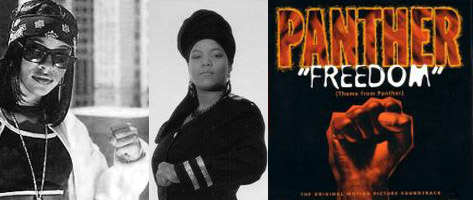 In
Ina nostalgia-induced stupor the other day, I stumbled upon the song
"Freedom" while clicking around YouTube. I mean, I remember the song
itself but seeing the sheer number of successful black female rappers,
singers and musicians moved me. It struck me that one of the reasons I
was so moved is because even entertaining the thought of a similar
recording today was disheartening. So then I started thinking about
what has happened in the last thirteen years since "Freedom" was
released as the lead single for the Panther Original Soundtrack (1995). I compiled a short list (read: long entry) of five reasons why "Freedom" is impossible today.
To get into the right frame of mind, you first have to watch the video.
5. The negative effects of 'thuggification' on women artists of urban music.
It only stands to reason that the rise of the 'thug' to
dominance in urban music would mark a decline in the visibility strong
women artists in its representative genres (namely hip-hop and
r&b). When "Freedom" was released in 1995, urban music had not yet
been completely mainstreamed. Subsequent years showed that record
labels would equate high sales with an increasingly hyper-masculinized
caricature of a 'thug' -- complete with all of the misogyny, violence
and excess possible. By early this decade it had gotten to the point
that the most visible women in urban music had been transformed into
accessories, regardless of musical talent; the predominant image of
women in urban music were hyper-feminine, negatively sexualized,
complimentary caricatures to the 'thug,' relegated to dancing,
stripping and singing hooks for him. Even though many of the women who
contributed to "Freedom" have continued to make great music, and there
are a number of women in recent years who have rejected the
thuggification trend and been successful, the larger impact would
likely hinder production and promotion of "Freedom" today.
4. Lack of a celebration of diversity in the representation of black women in music.
All of us here at SoulBounce know that there is a breadth of
diversity in the practitioners of urban and soul music. The producers
of "Freedom" knew it, too, and they managed to put together sixty of
its most popular and talented black women. Sixty. From TLC, to Vanessa Williams, to Joi, to Sweet Sable, to Aaliyah,
all of these women came from different genres, and reflected different
generations and levels of mainstream popularity. Today even though
there remains a lot of diversity it certainly isn't celebrated and
embraced outside of forums like SoulBounce, and it's definitely not
reflected in popular urban music media the way it was during the time
of "Freedom." Imagining a group that today theoretically would have to
include (remember sixty) Beyonce, Ciara, Jill Scott, Miss Jack Davey, 'Lil Mama, Muhsinah and Alicia Keys, feels as absurd as the original "Freedom" feels organic.
3. Solo divas and the lack of real singers.
Pulling
together sixty black women from urban/soul music may be a struggle, but
it's vaguely doable. (Especially if you cheat and bring in some of the
original contributors which would undoubtedly happen even though it's
akin to Patti LaBelle and Diana Ross singing on the
original.) And let's not be mistaken, there were a few unknowns
contributing vocals to "Freedom," so it's not like a remake would have
to be made up of multi-platunum pop sensations. "Freedom" was recorded
after the American Music Awards in 1994. The logistics of pulling
together sixty mostly notable contemporary black women singers in the
same place, let alone after an awards show, and expecting them to sing
as a group is impossible today. There are some talented solo singers
making music, sure. There is also a slew of studio manufactured
"performers" who can't sing a harmony without being fed the notes
seconds before the track was recorded. Additionally, so few of them
have experience blending their voices (no, singing over backups does
not count) that getting them to tone down the excessive vocal
embellishments on site would be quite the task. Of course then you have
to assign the verses, and considering some egos that task might doom
the entire project.
2. The disappearance of the female emcee.
- Advertisement -Period.
1. Empowerment, revolution, and politicized blackness are taboo.
- Advertisement -Freedom
for my body? Freedom for my mind? Propaganda? Lies? We have all the
goods on you? Just based on the lyrics alone this song would not be
recorded and released as the lead single for a major motion picture. Or
at all. The powerful concept of black women in music showing solidarity
by recording a song about black women rising up and taking back what's
ours is too aggressive, too black and too politically incorrect in
today's social climate. Possibly alienating or offending white
listeners is a risky move, as they are a major consumer base for urban
music. Singing a song with a group of other empowered, aware black
women that talks about making white folks run and hide from their
ancestors' transgressions, while bold, may not translate to increased
sales for the single or for each contributing artist's solo projects.
And it's certainly bound to offend a fair amount of industry executives
who fancy themselves progressive liberals because they promote music by
T-Pain and have a Teyana Taylor ringtone. Artistic and political merits of the song aside, "Freedom" was successful enough to break the Top 50 on Billboard's Pop Singles Chart, and push the Panther album into the Top 40.
Today "Freedom" would probably be leaked on the internet, be denounced
or apologized for by a large segment of its contributors, and get Robin Thicke all up in his feelings about it but then concede his respect for the song because he "lives with a black woman."


